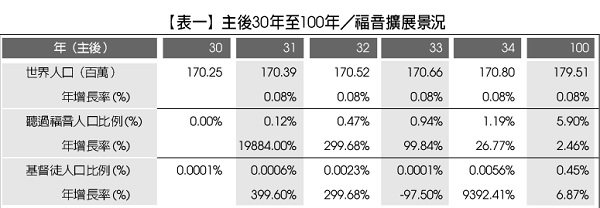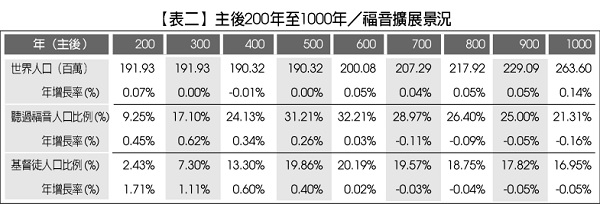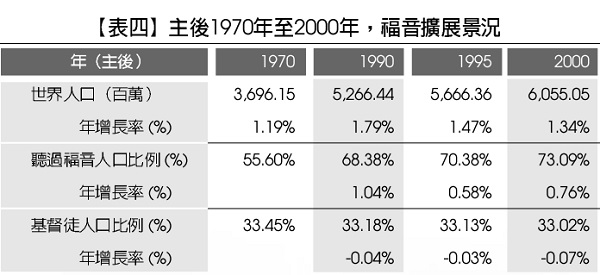[Overview of the Kingdom of God] Win this generation in the next twenty years!
Statistics on the expansion of the gospel from A.D. 30 to 2000 are made public

He (Jesus) told them another parable: “The kingdom of heaven is like a mustard seed, which a man took and sowed in his field. It was the smallest of a hundred seeds, but when it grew, it became larger than any other vegetable. And it became a tree, and the birds of the air came and stayed in its branches.” (Matthew 13:31-32)

The Lord Jesus predicted that although the kingdom of heaven (also known as the kingdom of God, that is, the church) would be small at first, it would one day become the largest kingdom. Today, two thousand years later, the Christian Church is indeed the largest group in the world, with approximately one-third of the population currently being Christians. The author combines all the information (especially thanks to Dr. David B. Barrett for collecting the information), organizes the world's population, the number of people who have listened to the gospel, the number of Christians and their growth rate from the time of Christ to the present day, and provides brothers and sisters and various evangelical groups with the opportunity to plan the gospel. Strategy reference.
From the table below, we can see that after the Lord Jesus was baptized, he performed miracles and wonders, which greatly increased the number of people who heard the gospel. Christians (or disciples who follow the Lord) began to grow rapidly after Jesus was resurrected from the dead and the Holy Spirit came.

In AD 313, the two co-emperors of the Roman Empire, Constantine the Great (Western) and Licinius (Eastern), issued the Edict of Milan (Edit of Milan) to end the persecution of Christians in the Roman Empire; fifth AD century, more than 50% of the population of the Roman Empire became Christians. By the seventh century AD, about 32% of the world’s population had heard the gospel, and about 20% were Christians [see Table 2].
However, after Christianity became the Roman state religion, the growth rate of the number of people who heard the gospel and the growth rate of Christians gradually declined. By the eighth century AD, both showed negative growth. One of the main reasons was the collapse of the Western Roman Empire, coupled with Muhammad's founding of Islam in 610 AD and his use of force to preach, which led to losses for the Kingdom of Christ.
The negative growth of the gospel did not break through until the eleventh century, and continued to grow until the thirteenth century. Coincidentally, the Crusades began in 1095. It is worth mentioning that in 1266, Kublai Khan, the founder of the Yuan Dynasty of China, asked Marco Polo’s father, Niccolo Polo, to petition the Pope to send missionaries to Mongolia. He himself was also willing to be baptized and become a Christian. This matter was ignored by the Pope. Some people believed that this was the greatest loss of growth opportunity ever before for the Kingdom of God.

The gospel experienced negative growth again in the fourteenth century, when there were two major events: 1. The Black Death plague killed one-third of the European population from 1347 to 1350, including 25 million Christians. 2. In 1380, the Mongol king Tamerlane massacred five million Christians. After the fifteenth century, the Kingdom of God gradually grew. By the beginning of the twentieth century (1900), 46% people in the world had heard the gospel, and the Christian population accounted for 34% of the world's population.
In the past 100 years, due to the development of medicine and health technology, the world's population has increased significantly, from 1.6 billion in 1900 to 6.1 billion in 2000. The number of people who have heard the gospel has also increased significantly through advances in communication and transportation technology. So far, more than 73% of the people in the world have heard the gospel. However, although about 70,000 people become Christians every day, the rate of increase in the Christian population still cannot keep up with the increase in the world's population. As a result, the proportion of the world's Christian population has not increased but decreased in the past century.

These observations lead to two important current issues: 1. Simply hearing the gospel is no longer enough to expand the Kingdom of God, and new strategies are needed. 2. The population of today’s generation is larger than all previous generations combined. Therefore, To gain this generation will gain Christ the greatest number of people in history. Without today’s population, we will forever fail the Great Commission given to us by the Lord, and the next twenty years will be a critical moment in the decisive battle for the Kingdom of God. The author will discuss these two important topics in the next issue.
 Author profile
Author profile
Dr. Yang Yongqing, founder and senior pastor of Christian Pioneer Church, CEO of Flying Eagle Publishing, holds a PhD in materials science from the University of Illinois (Champaign Campus) and holds a master's degree in business administration. There is a particular burden on leader development.
